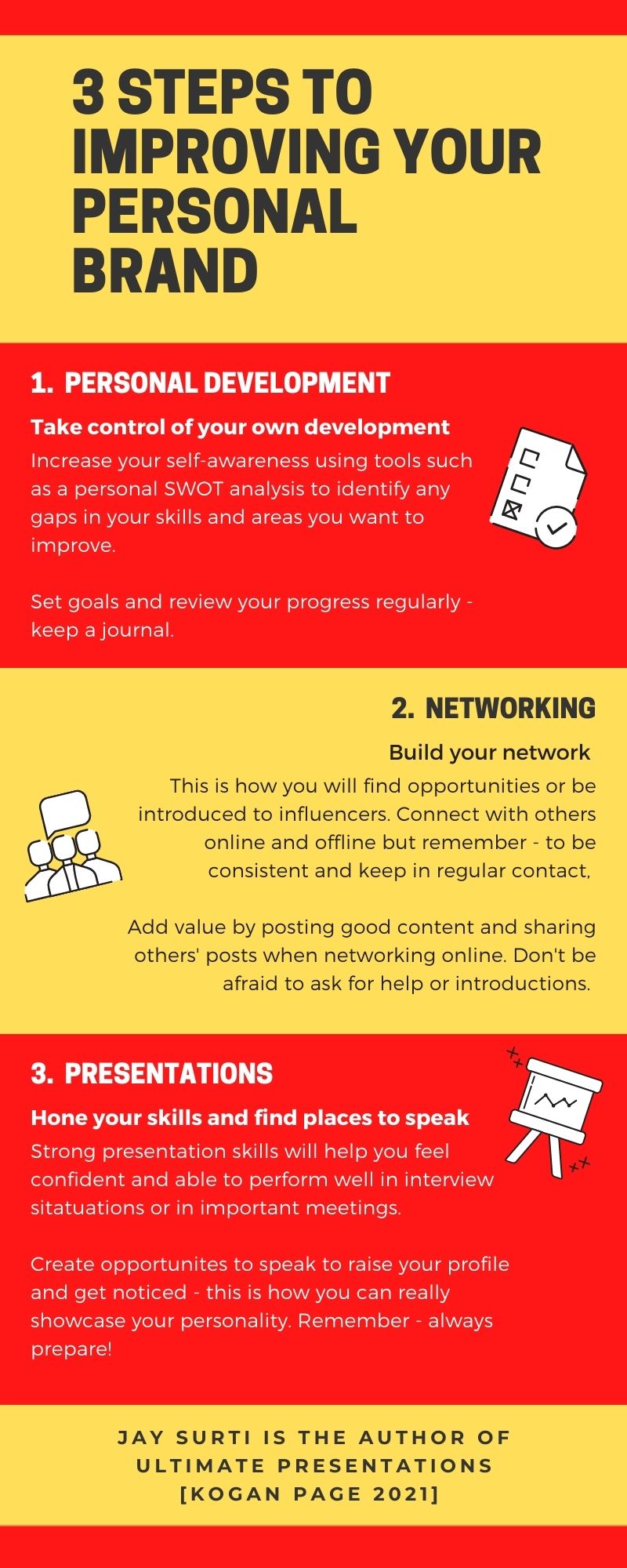For as long as I can remember, it has always been a challenge to find ways to stand out in a competitive job market, but with so much turmoil over the last couple of years, much has changed. Many sectors are struggling and the competition for jobs has therefore increased. I come from a world in which sending a written CV with a covering letter in response to a job advert was enough. Now, of course, the recruitment process is radically different – whilst there is still a place for CVs, these days your online presence is much more relevant.
There is a concept called “personal brand” that is talked about a lot. Your brand exists whether you do something about it or not. It is your reputation – what others think about you whether they have met you or not. The great news is, you can increase your competitive advantage by taking control of your personal brand and actively working on enhancing it.
If you apply for a job, chances are that a prospective employer will look you up online. If you deliver a presentation as part of an interview process or meet people in a networking scenario, they will draw conclusions about you based upon the interaction. Judgements are made very quickly so you need to stack the odds in your favour to make sure you are perceived the way you want to be. It doesn’t matter how brilliant you are – you need to make sure others know who you are and what you can offer. This means ensuring that you are actively raising your profile and being visible to the right people. You need to work on strengthening your personal brand.

There are 3 core elements to building your personal brand:
1. Personal development
Work on developing your skills – both technical as well as soft skills such as effective communication and networking. Many employers will have an annual appraisal process where objectives are set for the year ahead with one or two development goals. This is not enough; you need to manage your own development journey by periodically carrying out a self-assessment using tools such as a personal SWOT analysis to identify any gaps and having a regular review process to check your progress. Keep your own development journal or log – that way it goes with you when you move to a new employer or are in between opportunities. I am a strong believer in personal development and consider that research/reading industry articles etc. and keeping on top of trends is very important. This level of knowledge can give you an advantage in interviews or talking points when networking. Make it a regular habit and ensure you set aside time each week to do this.
2. Networking
Raising your profile means being visible to the right people – employers, influencers and those who can connect you to opportunities such as potential vacancies. The more you develop your network through building relationships, the better your chances. Networking is no longer just about attending events in person – walking into a room full of strangers and making an impression with a view to following up later. A lot of networking happens online through platforms like LinkedIn. When you post updates, comment or like posts other people have shared, this raises your profile. I would encourage you to think about your online activity with your “networking” hat on – remember that whatever you do online is visible so think before you act. At the same time, it’s important to engage with others by sharing your opinion, useful content and making introductions in your network. This is building your social capital and enhancing your reputation. When was the last time you reviewed how often you keep in touch with people? Be consistent, maintain your connections and don’t be afraid to ask for help or introductions to people you wouldn’t necessarily be able to reach.
3. Presentation Skills
Speaking or presenting is an integral part of life in the workplace for pretty much any type of sector you are in – from job interviews to introducing yourself when networking, as well as team meetings, client pitches, and media opportunities, to name but a few. Being good at your job is not enough. People need to know about you and one of the best ways to show them is by honing your presentation skills and using them in a smart way.
Working on your presentation skills will give you confidence when you talk about yourself in interview or networking situations. If you are already a confident speaker, continuing to work on your skills will help you think on your feet and increase your ability to react better in high-pressure situations. Simple steps such as sketching out a few talking points before an important meeting will make a difference. Even better if you rehearse what you would like to say out loud (maybe even record it on your phone so you really get a good idea of how you come across!). If I had to give you one tip on this topic it would be to always prepare – never wing it.
Above all, taking opportunities to speak will improve your personal brand – this is when people get an insight into your personality and consider what it might be like to work with you. This can be anything from speaking up at team meetings to seeking opportunities to present at seminars (both internal and external) or being part of a panel discussion. If you have video clips of you speaking, then add them to your LinkedIn profile – remember, recruiters etc. will look you up anyway, so if you can have a richer profile online then make sure you pull in any relevant evidence. In the absence of that, perhaps think about asking someone who has seen you speak to give you a recommendation on LinkedIn?
To get that competitive edge, take control of your own brand with these three steps. Adopt a regular practice of increasing your self-awareness to identify any areas you want to improve and set some goals towards that. Think about how proactive you are at networking – can you be more visible both online/offline? Lastly, find more opportunities to speak even if they are small – it’s one of the best ways to be memorable.
BIO
Jay Surti is a business presentation coach, speaker, consultant and author of Ultimate Presentations: Master Interviews and Presentations to Land Your Dream Job. She works with executives, teams and MBA candidates to help them transform their presentations to make sure they engage with their audience and get their message across. She has been a Judge at MassChallenge UK and served as an Executive Board member of Women in Banking and Finance and the University of Dundee.
